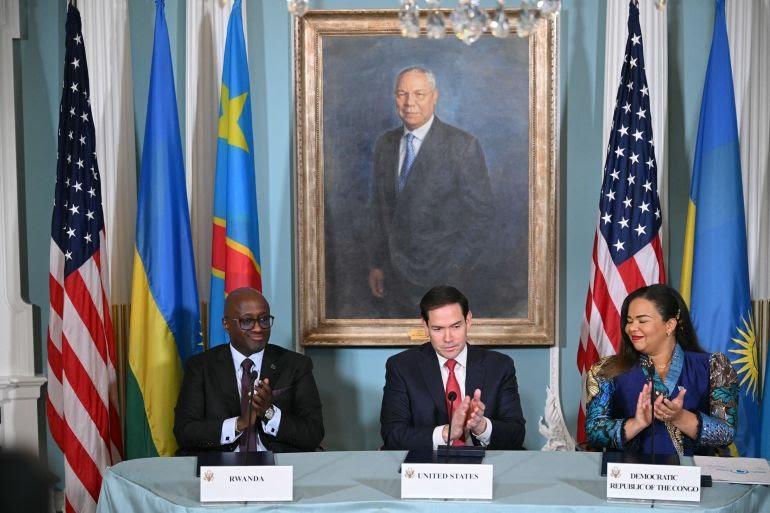Rwanda and the Democratic Republic of Congo signed a US-brokered peace agreement Friday in Washington, a move aimed at halting decades of conflict in Africa’s Great Lakes region, but one that also potentially grants the United States access to vast mineral wealth beneath Congolese soil.
The deal, signed in the presence of US Secretary of State Marco Rubio, followed intense mediation involving the United States, Qatar, and the African Union. It seeks to end bloodshed that has killed thousands and displaced hundreds of thousands in the mineral-rich eastern Congo.
While the agreement demands the “disengagement, disarmament and conditional integration” of armed groups in the region, it falls short of clearly addressing the sweeping territorial gains of the M23 rebels, an ethnic Tutsi force widely linked to Rwanda, who earlier this year seized control of major areas including the strategic city of Goma.
US Secretary of State Marco Rubio acknowledged the fragility of the peace, noting there was “more work to be done,” but said the deal offers “dreams and hopes for a better life.”
While signing the peace deal, Rwandan Foreign Minister Olivier Nduhungirehe emphasized Rwanda’s key demand, which includes the elimination of the Democratic Forces for the Liberation of Rwanda (FDLR), a militia composed mainly of ethnic Hutus tied to the 1994 genocide.
“The first order of business is to begin implementing the concept of operations for the neutralization of the FDLR, to be accompanied by a lifting of Rwanda’s defensive measures,” Nduhungirehe said.
“This is grounded in the commitment made here for an irreversible and verifiable end to state support for FDLR and associated militias,” he added.
His Congolese counterpart, Therese Kayikwamba Wagner, pointed to the principles of sovereignty and rule of law underpinning the agreement.
“By signing this agreement, we reaffirm a simple truth. Peace is a choice, but also a responsibility to respect international law, to uphold human rights and to protect sovereignty of states,” she said.
Despite the symbolism of the accord, many details remain under wraps. Prior agreements have faltered in the same region, and core disputes, including the presence of at least 7,000 Rwandan troops inside Congo and control of mineral-rich territories, remain unresolved.
Rwandan government spokeswoman Yolande Makolo told Reuters, the lifting of Rwanda’s defensive posture would be “contingent upon the FDLR’s neutralisation.”
Just hours before the signing, President Félix Tshisekedi’s office insisted that “the agreement does indeed provide for the withdrawal of Rwandan troops,” though it preferred to use the term “disengagement” which was described as “more comprehensive.”
However, Rwandan Foreign Minister Nduhungirehe noted sharply that “the words ‘Rwanda Defense Force’, ‘Rwandan troops’ or ‘withdrawal’ are nowhere to be seen in the document.”
US President Donald Trump, who helped push the agreement across the finish line, lauded it as a diplomatic win and boasted of the potential mineral gains for the United States.
According to reports in Washington D.C., Trump said the US will be able to secure “a lot of mineral rights from the Congo,” referring to the DRC’s enormous reserves of cobalt, lithium, and coltan, minerals vital to electronics and electric vehicles.
While referring to the Rwandan genocide, Trump said, “I’m a little out of my league on that one because I didn’t know too much about it. I knew one thing, they were going at it for many years with machetes.”
He plans to welcome both foreign ministers to the White House and has publicly expressed frustration over not being awarded a Nobel Peace Prize.
Meanwhile, Nobel Peace Laureate Dr. Denis Mukwege condemned the agreement, saying it amounted to rewarding aggression and legitimizing exploitation.
Read also: Amnesty International accuses M23 rebels of war crimes in Eastern Congo
“The deal would amount to granting a reward for aggression, legitimizing the plundering of Congolese natural resources, and forcing the victim to alienate their national heritage by sacrificing justice in order to ensure a precarious and fragile peace,” Mukwege said in a statement ahead of the signing.
Eastern DRC remains a volatile patchwork of armed groups and competing international interests. The M23 rebellion, first born from a broken peace deal 16 years ago, reignited in late 2021 and exploded in scale early this year.
Despite widespread documentation and accusations by Washington, Rwanda denies supporting M23, maintaining that its presence in the region is purely defensive a response to FDLR threats. Kigali, in turn, accuses Kinshasa of backing the FDLR, a claim the Congolese government denies.
Last year, Rwandan and Congolese experts reached an agreement twice under Angolan mediation on the withdrawal of Rwandan troops and joint operations against the FDLR – but ministers from both countries failed to endorse the deal. Angola eventually stepped down as a mediator in March.









